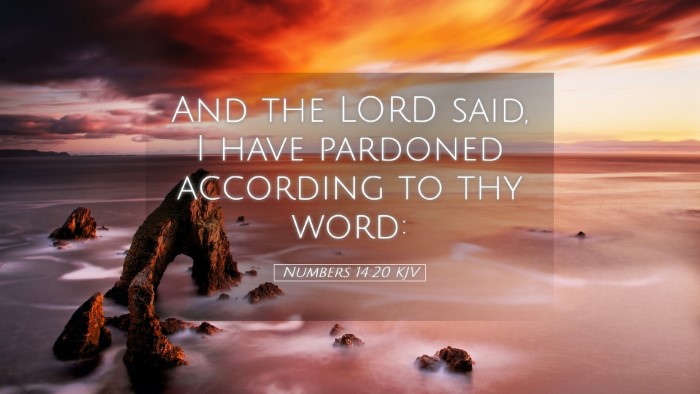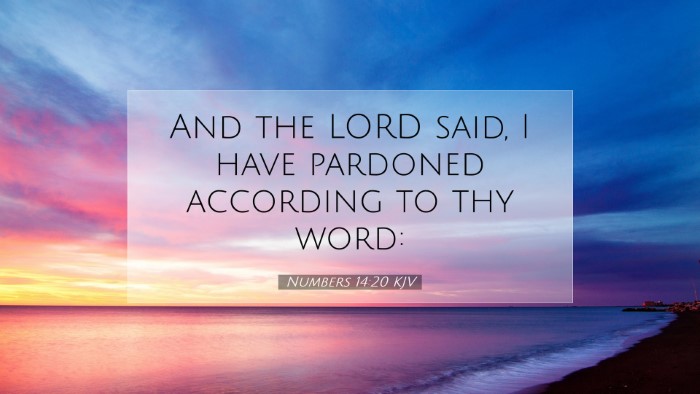Commentary on Numbers 14:20
Verse: "And the Lord said, I have pardoned according to thy word."
Introduction
This pivotal moment in the book of Numbers captures a significant interplay between God's justice and mercy. It reflects the character of God as both relational and responsive to the prayers of His servants. This commentary draws insights from esteemed public domain works, offering a robust exploration of the implications of this verse for understanding God's nature and human intercession.
The Context of Numbers 14
The narrative of Numbers 14 unfolds in the wilderness, following the disheartening report of the ten spies who surveyed the Promised Land. Their fearful testimony incited rebellion among the Israelites, leading them to question God's promise and sovereignty. Moses, acting as a mediator, pleads to God to spare the people from judgment. This passage exemplifies the dynamics of divine forgiveness amid human doubt and failure.
Insights from Matthew Henry
Matthew Henry emphasizes the grace of God in this verse. He notes that God's pardon is not lightly given; it is a reflection of His mercy and a testament to the effectiveness of intercessory prayer. Henry articulates, "The answer God gives to Moses shows that where there is a true heart in intercession, there is a rich supply of mercy." This highlights the transformative power of prayer and the role of a faithful leader.
Henry also points out that God's forgiveness does not negate the consequences of sin. He elaborates on how the Israelites would still face the repercussions of their unbelief, illustrating that while God pardons, He also purposes discipline to guide His people back to faithfulness.
Insights from Albert Barnes
Albert Barnes presents a comprehensive exploration of this verse, shedding light on God's compassionate nature. He comments on God's willingness to forgive in the face of persistent rebellion: "God is slow to anger, but rich in mercy." Barnes underscores that God's forgiveness is contingent upon the intercessor’s appeal, suggesting the profound effect of Moses' leadership and relationship with God.
Additionally, Barnes emphasizes the importance of the community's response to divine grace. He suggests that the dispensation of forgiveness invites an obligation to faithfulness among the forgiven. This notion posits that an experience of grace should foster greater obedience and reverence toward God's commands.
Insights from Adam Clarke
Adam Clarke's commentary reflects on the significance of God’s pardon in light of the collective failure of Israel. Clarke articulates, "This is a testimony to the power of sincere supplication." He suggests that Moses' imploring demonstrates the influence of leadership in spiritual matters and the importance of standing in the gap for others.
Clarke also explores the implications of God's mercy coupled with His justice. He notes that the mercy exhibited by God in pardoning Israel serves to elucidate His righteous character: while He forgives, He simultaneously holds His people accountable, ensuring they understand the weight of their transgressions.
Theological Implications
This verse raises profound theological questions surrounding the nature of prayer and divine interaction. It illustrates a God who desires to engage with humanity and is responsive to intercessory prayer. The capacity of Moses to appeal on behalf of the Israelites serves as a precursor to the New Testament's depiction of Christ as the ultimate intercessor.
Furthermore, the balance between justice and mercy in God's response invites deeper reflection on the role of sin and redemption in the believer's life. It provokes a call to understand that while forgiveness is offered, it does not erase the importance of confession and repentance in the ongoing relationship with God.
Practical Applications for Pastors and Leaders
- The Power of Intercession: Pastors are reminded of their calling to intercede for their congregations, echoing Moses' role. This teaches the importance of prayer in leadership and the responsibility leaders bear for their community's spiritual health.
- Understanding Grace: Leaders are encouraged to communicate the nature of God's grace, showing how it operates within the context of justice. Helping congregants grasp this balance is essential for their spiritual growth.
- Congregational Accountability: The passage calls for reflection on how communities respond to forgiveness. Leaders ought to cultivate environments that foster accountability and encourage members to live out the implications of grace in their lives.
Conclusion
Numbers 14:20 is a profound illustration of God's responsive grace amidst human frailty. The insights from Matthew Henry, Albert Barnes, and Adam Clarke collectively enhance our understanding of God's nature as merciful, just, and relational. The call to intercede for others remains a vital part of pastoral ministry, reminding leaders of the profound implications of prayer and the transformative power of God's forgiveness.
This verse not only deepens our theological understanding but also serves as a reminder to aspire toward greater faithfulness as we navigate our covenant relationship with God.


